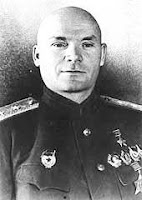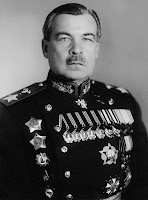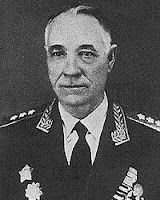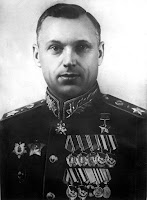On 22 June 1941, the 5th Army consisted of the 15th Rifle Corps (under Colonel I.I. Fedyuninsky[2] and incorporating the 45th Rifle Division and 62nd Rifle Divisions), as well as the 27th Rifle Corps (87th, 125th, 135th Rifle Divisions), the 22nd Mechanised Corps (19th, 41st Tank Divisions, 215th Motorized Division), the 2nd Fortified Region, seven artillery regiments, 2 NKVD border regiments, and an engineer regiment.[3]
Battle of the frontiers
The Army's rifle divisions were assigned to cover the Lutsk-Rovno approaches to the Ukraine and were tasked to man the (unfinished) Kovel, Strumilov, and Vladimir-Volynsk fortified districts.[4] The Army was stationed in barracks up to forty miles from the frontier, and would need three to four days to take up its positions. On 22 June, however, the 15th Rifle Corps managed to take its place in the line, holding the sector from Vlodava to Vladimir-Volynsk, but later that same day, the southern end of the line at Vladimir-Volynsk "began to buckle in," in John Erickson's words.
The main German thrust in the sector came at the junction point between the 5th Army and its neighbour to the south, the 6th Army, and both the 5th and 6th Armies committed their mechanised forces quickly to try to stem the gap, but without success. The Commander Southwestern Front, Mikhail Kirponos, decided to halt this with an attack into the flank of Panzer Group 1 using all the available mobile forces – five mechanised corps. This was unsuccessful in the face of the thrusting German advance, lack of coordination from the various Soviet formations, acute shortage of equipment and spares, and lack of proper equipment, especially radio sets.[5] Meanwhile General M.I. Potapov, now commanding the 5th Army, was ordered on 29 June to make another attack on Panzer Group 1's flank from the woods of Klevany. Amid these efforts, Kirponos managed to withdraw most of his Front to a new line almost on the old Soviet/Polish border, and prevented the Germans from rupturing the Soviet defensive line.[6]
The 11th Panzer Division took Berdichev on 7 July, and the juncture between the 5th and 6th Armies was broken; the Stavka ordered Kirponos to withdraw the 5th Army to the Korosten "fortified district" northwest of Kiev. The gap between the 5th and 6th Armies quickly widened to forty miles. To remedy the situation another counterattack was ordered, and Potapov, now commanding the 15th and 31st Rifle, and 9th, 19th and 22nd Mechanised Corps, was directed to strike northwards from Berdichev and Lyubar. However, his forces had been badly worn down: the 9th Mechanised Corps had 64 tanks left, the 22nd less than half that number, and the rifle regiments of 31st Corps had "no more than three hundred men."[7] Nevertheless, Potapov's force cut the Zhitomir highway and kept up the pressure for a week, and afterwards remained as a thorn on the German Sixth Army's northern flank.
By 7 September the 5th Army was threatened with being split in two by the Second Army coming from the east and the Sixth Army's northern outflanking of Kiev. The Stavka refused permission initially for the 5th Army to withdraw, as they were still hoping for results from a counterattack by the Bryansk Front. By 9 September Stalin had finally given authority for the 5th Army to withdraw but by then it was trapped, and on 20 September Potapov and his command group were taken prisoner.[8] In the disastrous battle, the German forces encircled forces from the 5th, 21st, 26th, and 37th Armies, captured Kiev, and claimed 665,000 prisoners (Soviet sources assert that the total strength of the Southwestern Front was 677,000 of which 150,000 had escaped).
Active 1939 to 1945
Engagements
Operation Barbarossa
Commanders
Major General M.I. Potapov, June to September 1941
Major General Dmitry Lelyushenko, 11 to 17 October 1941
 |
| Dmitry Lelyushenko |
Major General of Artillery Leonid Govorov, 18 October 1941 to 25 April 1942
 |
| Leonid Govorov |
Major General Ivan Fedyuninsky, 25 April October 15, 1942
 |
| Ivan Fedyuninsky |
Colonel General Yakov Cherevichenko, 15 October 1942 to 27 February 1943
 |
| Yakov Cherevichenko |
Lieutenant General Vitaly Polenov, 27 February 1943 to 25 October 1943
Lieutenant General Nikolay Krylov, 25 October 1943 to 16 October 1944
 |
| Nikolay Krylov |
Lieutenant General Pyotr Shafranov, 16 October to 16 December 1944
 |
| Pyotr Shafranov |
Colonel General Nikolay Krylov, 16 December 1944 to December 1945
 |
| Nikolay Krylov |
Army Troops
15th Rifle Corps - Major General Ivan Fedyuninsky
 |
| Ivan Fedyuninsky |
45th Rifle Division - Mj.Gen. G.I. Sherstyuk
62nd Rifle Division - Col. M.P. Timoshenko
27th Rifle Corps - Major General P.D. Artememko
87th Rifle Division - Mj.Gen. Filipp Alyabushev
124th Rifle Division - Mj.Gen. F.G. Sushii
135th Rifle Division - Mj.Gen. F.N. Smekhotvorov
22nd Mechanized Corps - Major General S.M. Kondrusev
19th Tank Division - Mj.Gen. K.A. Semenchenko
41st Tank Division - Col. P.P. Pavlov
215th Motor Rifle Division - Col. P.A. Barabanov
Transferred to 5th Army from Front command on evening of June 22nd
9th Mechanized Corps - Major General K.K. Rokossovsky
 |
| Konstantin Rokossovsky |
20th Tank Division - Col. M.E. Katukov
35th Tank Division - Mj.Gen. N.A. Novikov
131st Motor Rifle Division - Col. N.V. Kalinin
19th Mechanized Corps - Major General Nikolay Feklenko
 |
| Nikolay Krylov |
40th Tank Division - Col. M.V. Shirobokov
43rd Tank Division - Col. I.G. Tsibin




No comments:
Post a Comment